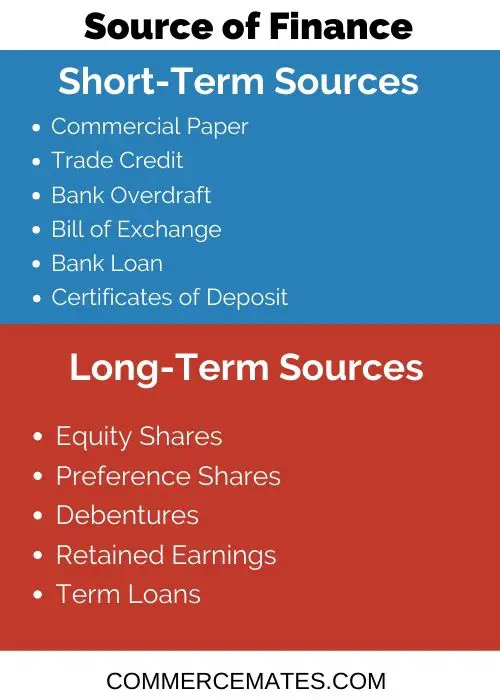Contents
Meaning of Long-term and Short-term sources of Finance
Sources of Finance are the means used for raising funds by business for carrying out their activities. Every business always need some amount of money for ensuring their continuity. They acquire these funds using different sources of funds available in market. Business chooses a particular source of finance according to their needs and capacity.
Sources of funds are classified on various bases such as on time-period, control, source of generation and ownership. On time-period basis these sources are further classified into long term and short term source of finance.
Short-term sources of finance are those which are used for raising funds for short period of time that is less than one year. Money raised through short term source is required to be paid back within one year. Long-term sources of finance are those which help in getting funds for longer period that is more than one year. Funds raised through these can be paid back over many years.
Short-Term Sources of Finance
Short-term sources of funds: Money acquired must be paid back within one year. These sources are used for fulfilling short-term funds requirements.
Various types of short-term sources of funds are as follows:-
Commercial Paper
Commercial paper is an unsecured promissory note issued by high creditworthy companies for raising short-term funds. The maturity period of this source ranges from 91 to 180 days. Commercial papers are issued by companies to banks, insurance companies, or business funds at discount on face value and are redeemed at their face value on maturity.
Trade Credit
It means credit provided to the business by the supplier of raw materials or goods for the short term. Trade credit helps businesses in continuing their operations without interruption as it helps them in getting supplies without any immediate payment. Businesses are not required to pay any interest amount on trade credit.
Bank Overdraft
Bank overdraft is a credit facility extended by the bank to their account holders for a shorter period. Under this facility, customers can overdraw the amount from their account up to a certain limit set by the bank. Customers need to pay interest over the overdrawn amount to the bank.
Bill of Exchange
Bill of exchange is a financial instrument which is drawn by the creditor upon his debtor. It is a written negotiable instrument which contains an unconditional order for paying the mentioned amount to the holder of the instrument. This instrument is either payable on-demand or on the maturity of a particular time period.
Bank Loan
It means borrowing from the bank at a specific rate of interest for a particular period of time. Bank grants loan to borrower against some sort of security which they need to deposit at the time of taking the loan. Customers need to pay interest regularly to bank on the sanctioned amount. A loan is repaid to the bank either in lump sum amount or in instalment as may be decided at the time of entering the contract.
Certificates of Deposit
It is an unsecured negotiable instrument issued by commercial banks or financial institutions to investors. Certificate of deposit is issued to depositors against the amount deposited by them for a fixed maturity period. The maturity period of these instruments is decided in accordance with the needs of depositors and ranges from 90 to 365 days.

Long-Term Sources of Finance
Long-term sources of fund: Fund raised through these instruments can be paid back over many years. It enables in fulfilling money requirements needed for longer time period.
Various types of long-term sources of fund are as described below:-
Equity Shares
It is the capital market instrument issued by companies for acquiring funds for a long period of time. These shares represent ownership capital in the business. Equity shareholders are real owners of the business and have full voting rights. They have full control over the functioning of the company and also elect directors.
Preference Shares
Companies can issue another type of shares for raising long-term funds known as preference shares. These shares carriers some preferential rights over ordinary or equity shares. Preferential shareholders are eligible to get a fixed rate of dividend on their shareholdings and that too before paying any dividend to equity shareholders. In addition to this, these shareholders are paid back their capital amount before the equity shareholders.
Debentures
A debenture is a debt instrument issued by the company for raising long-term funds. It represents debt capital and holders of these instruments are creditors of company who possess no voting rights. On debentures, fixed rate of interest is paid irrelevant of whether profit earned or not by the company.
Retained Earnings
It means reinvesting the profit earned by the company back into its activities for expansion and growth. Companies instead of disturbing all of their earnings among shareholders, retain some part of it for investing it back into their operations. This is also termed as ploughing back of profits.
Term Loans
It refers to long term loans taken by business from commercial banks or other financial institutions. Lending institutions require some sort of security for approving the loan amount. Borrowers need to pay a fixed rate of interest regularly to the lending company and full borrowed amount before the period of maturity.